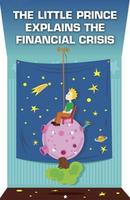The Little Prince Explains the Financial Crisis
In a time of global crisis, there is a lot we can learn from the simple wisdom of The Little Prince
Everyone’s trying to pinpoint the reasons that led us to the financial crisis, and many are writing very long dissertations on it. But the fact of the matter is that the reason can be summed up in just three letters: E-G-O, as many are realizing today. In other words, we were dragged into this turmoil because our interpersonal relationships are not built by the principle of, “Love your neighbor as yourself,” but rather by, “What’s in it for me?” Like all of our problems, the financial crisis is an outcome of our self-centered actions, thoughts, and desires.
Lately the leading financiers, analysts and journalists also recognize that the financial crisis is really a crisis of moral values. "We don’t just need a financial bailout," wrote Thomas L. Friedman in his December 16 Op-Ed column in The New York Times, "We need an ethical bailout… I don’t want to kill the animal spirits that necessarily drive capitalism - but I don’t want to be eaten by them either." And boy, is he right. As the current crisis demonstrates, people’s insatiable greed has given rise to a hoarding mentality of irresponsible accumulation, until the “pile” they’ve been storing away finally tipped over.
But while the leading financers are trying to recover from the fact that the crisis caught them so off guard, it turns out that some already knew about the prospects of their self-centered economic approach all along…
A conversation between the Little Prince and a businessman (selected excerpts from the book The Little Prince by Antoine de Saint-Exupéry written over half a century ago):
“And what do you do with five-hundred millions of stars?”
“Nothing. I own them.”
“And what good does it do you to own the stars?”
“It does me the good of making me rich.”
“And what good does it do you to be rich?”
“It makes it possible for me to buy more stars, if any are ever discovered.”
“How is it possible for one to own the stars?”
“I administer them,” replied the businessman. “I count them and recount them…”
The little prince was still not satisfied. “If I owned a silk scarf,” he said, “I could put it around my neck and take it away with me. If I owned a flower, I could pluck that flower and take it away with me. But you cannot pluck the stars from heaven…”
“No. But I can put them in the bank.”
“Whatever does that mean?”
“That means that I write the number of my stars on a little paper. And then I put this paper in a drawer and lock it with a key.”
“The grown-ups are certainly altogether extraordinary,” the little prince said simply, talking to himself as he continued on his journey.
